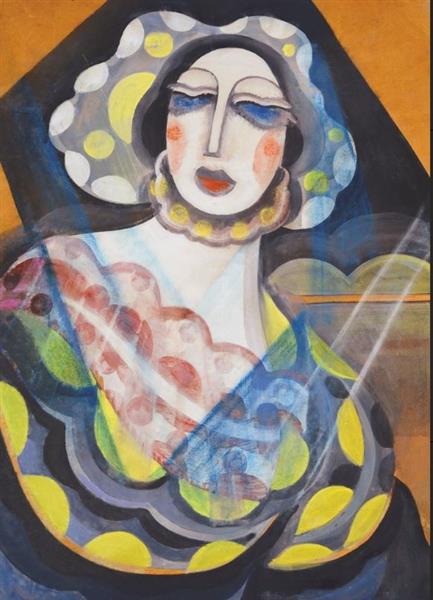Description
Hugó Scheiber, an outstanding exponent of Hungarian modernism, achieves in his work "Art Déco Hölgy" (Lady Art Deco) a captivating synthesis of the aesthetics of the Art Deco movement, which flourished between the 1920s and 1930s. The work captures the Sophisticated and elegant essence that characterizes this style, known for its geometric ornamentation and its emphasis on industrial modernity. Through "Hölgy", Scheiber invites us to explore a visual universe that fuses tradition with the contemporary innovations of its time, and its painting becomes a brilliant mirror of the society of the period.
The composition of the work is notoriously balanced, where the central female figure unfolds gracefully in an environment that enhances its presence. The lady, dressed in a precise line clothing, assumes a pose that radiates confidence and authority, catching the viewer's attention. The figure is characterized by a masterful use of colors, where rich and vibrant tones predominate that evoke a feeling of luxury, so representative of the art deco aesthetics. The depths of blue and the warmth of the gold are intertwined, with a contrast that highlights the glamor of the female figure. These chromatic elections not only embellish the work, but also suggest an underlying narrative of modernity and social change in a time of transformation.
Geometry and patterns play a crucial role in "Art Déco Hölgy." The lady is surrounded by decorative elements that reflect a characteristic visual language of the Art Deco, where abstract forms and stylized designs predominate. When observing carefully, the influences of contemporary architecture and graphic design that defined the aesthetic panorama of the time can be discerned. These influences translate into an environment that seems both contemporary and timeless, creating an atmosphere that falls in love and fascinates at the same time.
In the work, the absence of a defined landscape or a specific narrative context allows the viewer to focus on the figure and symbolism that it represents. The lady here is an emblem of female empowerment and modernity in a world where women began to claim until then reserved spaces for men. Scheiber, through this figure, touches sociocultural aspects without the need for an explicit narrative, letting the viewer's gaze complete the story in a visual dialogue.
Although it is recognized that Scheiber is an artist who lived and worked mostly in Hungary and that his work is appreciated in various artistic circles, "Art Déco Hölgy" becomes a reference to understand the intersection between art, fashion and social change that characterized the time. The painting not only stands out for its technical virtuosity and its beauty, but also invites reflection on the evolution of roles in contemporary society and the impact of art on the perception of these transformations.
In conclusion, "Art Déco Hölgy" opens a window to the vibrant and striking world of the 20s and 30s, where Hugó Scheiber displays his ability to capture not only the aesthetics of a period, but also the spirit that defines it. The work is a testimony of his mastery as a painter and his commitment to the tendencies of his time, positioning himself as a pillar in the continuous exploration of Art Deco and his resonance in modern art.
KUADROS ©, a famous paint on your wall.
Hand-made oil painting reproductions, with the quality of professional artists and the distinctive seal of KUADROS ©.
Art reproduction service with satisfaction guarantee. If you are not completely satisfied with the replica of your painting, we refund your money 100%.

